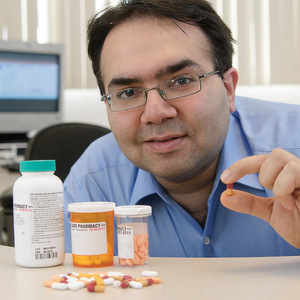Doctors should not be discouraged from prescribing isotretinoin to adolescents for inflammatory acne, according to a new study by Canadian and U.S. scientists showing the drug does not increase the risk of inflammatory bowel disease (IBD).
Led by Mahyar Etminan, an Assistant Professor in the Department of Pediatrics, the scientists addressed this important drug safety question because of a previous study linking the drug (commonly known by its original commercial name, Accutane) to IBD. In this new report published February 20 in JAMA Dermatology, Dr. Etminan’s team says theirs is the first to statistically adjust for severe acne, which is a strong confounding variable that may have led to the overestimation of risk in the earlier study.
The JAMA Dermatology article, co-authored by James Brophy of McGill University, covered two studies. In one study, the researchers analyzed the health records of a large population of U.S. women between 24-34 years of age. Of the women, 2,159 had IBD and 43,180 did not. Only 10 (0.46 per cent) of the women with IBD and only 191 (0.44 per cent) of the women who did not have IBD had used isotretinoin. In the second study, the researchers comprehensively reviewed and analyzed the results of published and unpublished studies. They did not find that isotretinoin increases the risk of IBD.
In 2009, Accutane was removed from U.S. shelves by its maker after juries had awarded millions of dollars in damages to former users over inflammatory bowel disease claims. The drug continued to be sold in Canada, and generic versions continue to be available in the U.S.
“We’ve come to the conclusion that there’s no risk that the drug causes inflammatory bowel disease,” says Dr. Etminan, a scientist with the Therapeutic Evaluation Unit at the Child & Family Research Institute and the Provincial Health Services Authority. “This drug is used for very severe acne that is very traumatic with psychological effects, and it is very effective. Hopefully with this study, it may put dermatologists at ease with prescribing this drug to children and adolescents, knowing that it doesn’t cause this adverse effect.”
